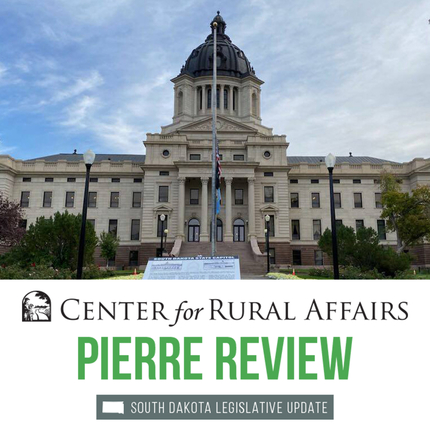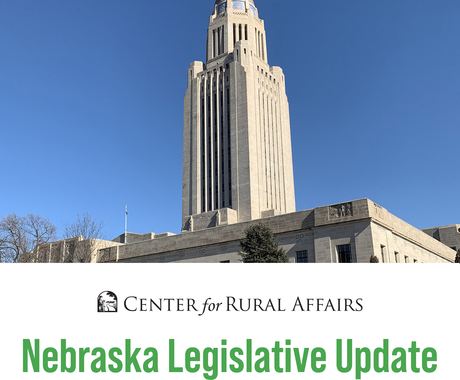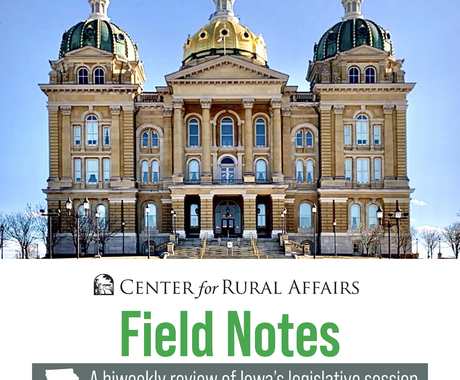Today is Day 19 of South Dakota’s 38-day legislative session, which will conclude March 27.
The last day for bill introduction was Feb. 2. Bills must pass out of their house of origin by Feb. 22, which is known as Crossover Day.
All bills must pass out of both houses by March 6 (Legislative Day 34).
We welcome your input. Feel free to be in touch about these or any other bills you feel are important to rural communities. I can be reached at heidiku@cfra.org or 605.240.0039.
Energy and environment
House Bill (HB) 1228 – Oppose: Introduced by Rep. Scott Moore, the bill would revise Public Utilities Commission (PUC) permit procedures for energy conversion and transmission facilities. If enacted, the bill would extend the deadline for the PUC to provide decisions on permit applications from 12 to 24 months and would allow any party to request a deadline extension for commission action. These changes have the potential to create extensive delays in the clean energy permitting process.
HB 1228 has been referred to the House Commerce and Energy committee. As of today, a hearing has not yet been scheduled.
HB 1029 – Oppose: Brought at the request of the Department of Agriculture and Natural Resources, the bill would revise certain provisions in the county zoning and appeals process. The bill makes several amendments to the current statute, including changing the requirement for approval of a conditional use request from an affirmative vote by the majority of the committee members, to an affirmative vote by the majority of the committee members who are present and voting. While intended to speed up the permitting process, this change could allow commissioners to sit out important votes or for a small number of individuals to make significant decisions.
HB 1029 was heard in the House Agriculture and Natural Resources committee on Jan. 19. During the discussion, multiple legislators expressed concern over the change from a majority vote to a majority who are present and voting. It narrowly passed with a vote of 7-6. It was heard in the House on Jan. 23 and passed with a split vote of 40-30. It will now go to a Senate committee. As of today, a hearing has not yet been scheduled.
HB 1089 – Support: Introduced by Rep. James Wangsness, HB 1089 would require notice and compensation prior to entry upon private land for the purpose of examination and survey. HB 1098 relates to eminent domain and statutes governing energy conversion and transmission facilities that require a siting permit. Current law states after having filed a siting permit with the Public Utilities Commission, anyone seeking to conduct a survey or examination must give the owner or tenant 30 days written notice and make a payment to the owner. The amendment adds this notice must also include the anticipated date of entry and the name and contact information of the person who will be entering the property. It also specifies a compensation amount of $500.
HB 1089 was heard in the House State Affairs committee on Feb. 6. During testimony it was noted that the statute amended in this bill was currently the subject of numerous lawsuits and there was hesitation to engage legislatively while that process was taking place. Ultimately the bill was sent to the 41st day (killed) on a vote of 9-3.
Economic and community development
HB 1212 – Support: This bill, introduced by Rep. Mills, appropriates $100 million in funds for the support of county projects and residents. Half would come from American Rescue Plan Act (ARPA) funds, and half would come from the state’s general fund. Counties would be allowed to disburse these funds for capital projects such as infrastructure, housing, jails, rehab facilities, or other repairs and improvements. Funds could also be disbursed to county residents with incomes at or below 300% of the federal poverty guidelines.
HB 1212 has been referred to the House State Affairs committee. As of today, a hearing has not yet been scheduled.
HB 1075 – Support: This bill, introduced by Rep. Mary Fitzgerald, lowers the state sales and use tax rate on food from 4.5% to 0%. While South Dakota’s food tax has long been debated, in 2022 Gov. Kristi Noem included repealing the state’s food tax as a central component of her re-election campaign. Two similar bills have also been introduced. HB 1095 and 1096 would lower the food tax to 2.5% or 3.5%, respectively. These bills will likely come into play should HB 1075 fail.
HB 1075 was heard in the House Taxation Committee on Jan. 26, which voted to refer the bill to the House Committee on Appropriations. As of today, a hearing has not yet been scheduled.
Senate Bill (SB) 41 – Support: This bill, brought by Sen. Casey Crabtree, establishes a program for housing infrastructure loans and grants. The bill appropriates $150 million, including $50 million from American Rescue Plan Act (ARPA) funds, toward housing infrastructure loans and grants. These funds will be administered through the South Dakota Housing Development Authority. Thirty percent of the funding will be directed toward municipalities having a population of 50,000 or more, and 70% of funds will go to all other areas of the state.
SB 41 was heard on Jan. 12 in the Senate Commerce and Energy Committee and passed 8-1. It passed the Senate on Jan. 13 with a vote of 29-2. The House State Affairs committee passed the bill 12-1 on Jan. 18, and the bill went to the House floor on Jan. 19. Several legislators brought amendments to the bill that were debated, and the bill was ultimately deferred to another day. On Jan. 23, the bill was heard again and several new amendments were debated. Ultimately it passed the House with a vote of 54-16 and was signed by the governor on Feb. 1.
Senate Bill (SB) 76 – Support: This bill, introduced by Rep. Jim Stalzer, provides for licensure by endorsement for certain professionals and occupations. The purpose of this bill is to recognize out-of-state licenses for an expanded list of occupations, including EMTs, teachers and other educational professionals, water and wastewater operators, and commercial pesticide applicators. This would make it easier for individuals with licensed occupations to become employed in the state.
SB 76 will be heard in the Senate Commerce and Energy committee on Feb. 7.
Let your voice be known
It’s critical that legislators hear from the people they represent. We encourage you to get involved in the legislative process by communicating with elected officials about the issues you care about. If you don’t know who your legislators are, you can find them at this link.
Most testifying is done in person. During COVID, legislators opened up remote testifying as an option and are debating whether or not to continue to allow remote testimony. Currently, it is up to each committee to decide whether or not to allow remote testimony. To find out if you can remotely testify on a bill directly, contact the committee that has been assigned to the bill. Email addresses can be found here by clicking on the specific committee.
Upcoming legislative forums:
Aberdeen Area Cracker Barrels, Feb. 4, Feb. 11, and March 4, hosted by the Aberdeen Area Chamber of Commerce
Rapid City Area Cracker Barrels, Feb. 11 and March 4, hosted by Elevate Rapid City
District 17 Legislative Coffee, Feb. 25, hosted by the Vermillion Area Chamber & Development Company and Governmental Affairs Committee
District 10, 11, and 12 Legislative Coffee, Feb. 11, hosted by the Greater Sioux Falls Chamber of Commerce
District 7 and 8 Legislative Coffee, Feb. 11, hosted by the Brookings Area Chamber of Commerce
District 2, 13, and 15 Legislative Coffee, Feb. 25, hosted by the Greater Sioux Falls Chamber of Commerce
District 21 Cracker Barrels, Feb. 11 in Corsica, 9:30 a.m., White Lake 1 p.m., and Platte 4 p.m.




